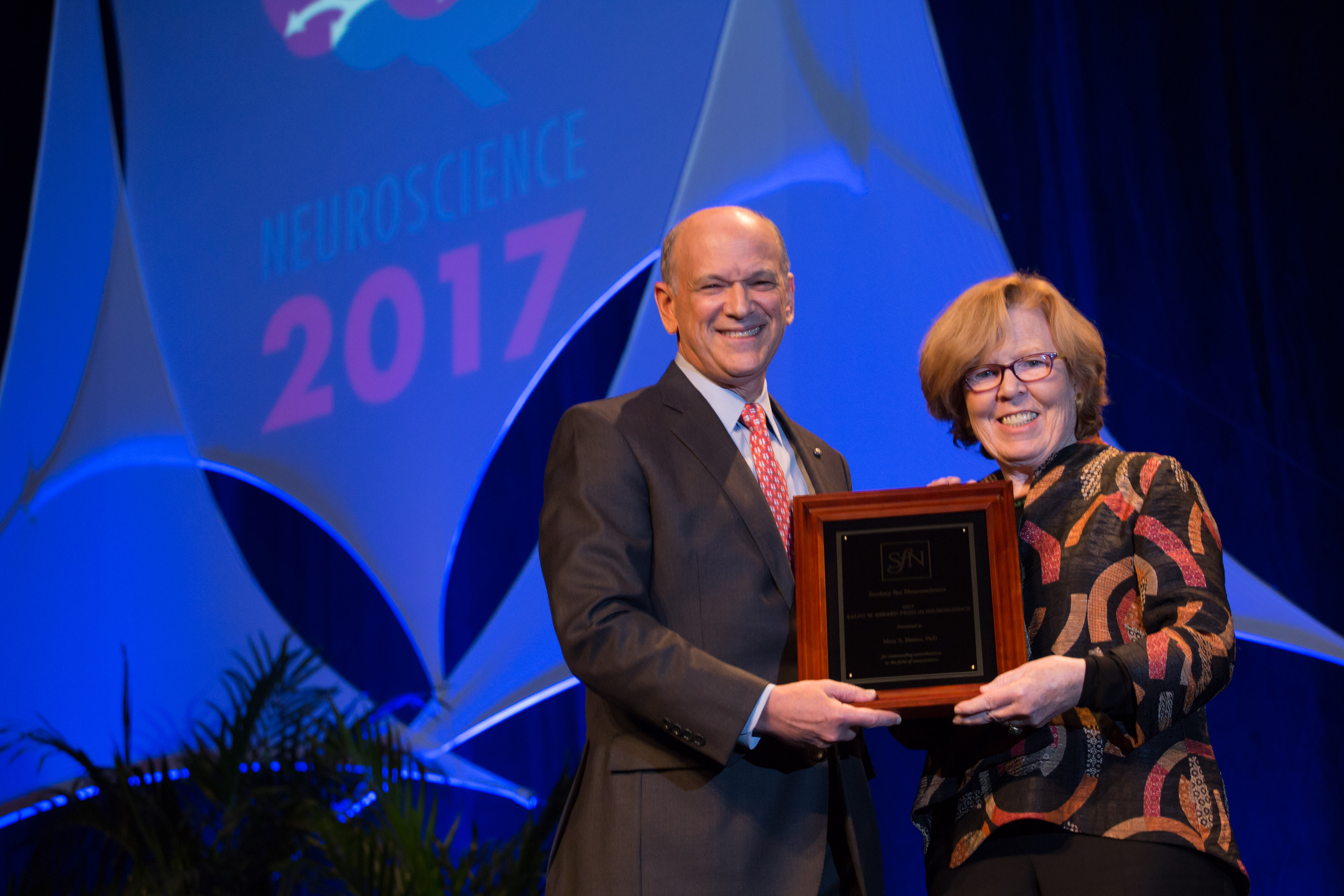
Fall Council Roundup
During its fall meeting in Washington, D.C., the SfN Council reviewed the highlights of Neuroscience 2017 and updates on major programmatic efforts to maximize SfN’s reach and impact to its global membership and the broader scientific community. The 2017 annual meeting included more than 30,000 attendees from 80 countries and over 13,000 scientific presentations showcasing innovative techniques and valuable research about brain structure, health, disease, and treatments. The following overview highlights key decisions and discussions by Council in November.
Generating Sustained Member Value for Institutional Programs
The Neuroscience Training Committee (NTC) came before Council to propose a broader definition of an Institutional Program (IP) member, recognizing the need to expand eligibility for this category. Previously, IP members were required to be “a formal program at any educational or research facility that includes pre- or postdoctoral trainees with a primary interest in scientific investigation of the nervous system.”
Council approved NTC’s request to expand upon the definition to also include short-term training grants, organizations with summer neuroscience programs, biology or psychology departments, pharmaceutical company postdoctoral programs, non-degree-granting research institutions, school consortiums, and physical science departments (including physics, engineering, computer science, and statistics). Both Council and the NTC believe the more inclusive IP membership definition will engage a broader group of significant entities in SfN activities.
Expanding Opportunities for Creative Annual Meeting Programs
Council received an update from the Program Committee that included innovative proposals to enhance the SfN annual meeting experience through engaging sessions with cutting-edge scientific topics and speakers. The Program Committee has been researching how personalized and organizational elements will lay the groundwork for future success.
In 2016, the Program Committee convened an Innovative Learning Working Group to explore ways to modernize the annual meeting by reviewing current offerings and brainstorming new opportunities. One working group recommendation implemented at Neuroscience 2017 was to designate a minisymposium slot for a “Storytelling Session.” At the working group’s request, Council has approved making this session a permanent fixture in the meeting programming.
Council also approved the working group’s proposal to implement new annual meeting sessions in which two to three well-known figures in neuroscience would engage in a discussion over a “hot issue” in the field. A moderator who is knowledgeable of the topic would facilitate the dialogue and pose guiding questions to ensure the audience grasps how the field arrived at its current understanding of the issue.
In addition, Council approved the working group’s recommendation to refine the selection process for SfN-sponsored socials by issuing a call for proposals to the SfN membership at-large. The proposals would be reviewed and scored in advance of the February meeting of the Program Committee, which would then approve the slate of SfN-sponsored socials. The working group spent ample time evaluating the success of standing socials at the annual meeting and decided that this refreshed selection process would invigorate attendance and address challenges in identifying event organizers.
Celebrating 50 Years of SfN and Scientific Progress
2019 will kick off a yearlong celebration of the Society’s 50th anniversary, beginning at the annual meeting in Chicago and culminating at Neuroscience 2020 in Washington, D.C., SfN’s 50th anniversary meeting. This year will be one that celebrates the strides SfN has made in nurturing scientific progress and creating spaces for neuroscience community to share cutting-edge discoveries and facilitate collaboration to encourage future advances. SfN was founded in late 1969 and the first annual meeting took place in 1971.
The SfN Council has charged a working group of five volunteer leaders with the responsibility of planning this high-caliber event. Through discussions, Council agreed that the 50th anniversary should be a strategic opportunity for SfN to engage its membership and therefore will receive funding from Council to support the working group’s endeavors.
Beginning a New Chapter of BrainFacts.org
Council had the opportunity to discuss the newly relaunched BrainFacts.org and review key upgrades. A public information initiative of The Kavli Foundation, the Gatsby Charitable Foundation, and SfN, BrainFacts.org represents a dynamic and authoritative hub for sharing the wonders of neuroscience with an international audience. In October, the site relaunched with a modernized architecture and suite of new multimedia features, including an interactive and anatomically accurate 3-D model of the brain. This easy-to-navigate model enables users to pull apart, isolate, and explore regions of the brain.
This is truly a new era for BrainFacts.org, and Council feels that the site’s audience-centric emphasis holds promise for engaging more individuals in neuroscience through experiential learning. The site’s new interactive elements encourage visitors to learn why we stop at a red light and how we taste popcorn or solve intricate problems — translating complex brain functions in a way that is accessible to all audiences.
Nurturing the Next Generation of Scientific Leaders
Trainee Professional Development Awards are a staple of the annual meeting and a key element of supporting the next generation of scientists. Every year, these merit-based awards are presented to deserving undergraduate and graduate students and postdoctoral fellows who demonstrate excellence in their research. These awards provide those in the early stages of their careers the chance to present a scientific abstract, meet peers and network with senior scientists, and participate in the wealth of learning at the annual meeting.
In 2017, SfN was able to bring a record-breaking 203 trainees to Washington to partake in the annual meeting. Due to this unprecedented success, the SfN Council has committed to matching contributions from individual donors and large donors in 2018. Up to $250,000 has been approved in matching funds to help SfN include as many deserving trainees as possible in the countless educational opportunities at the annual meeting. Eligible contributions to Trainee Professional Development Awards can be made online to the Friends of SfN Fund until June 30 to qualify for matching funds.























